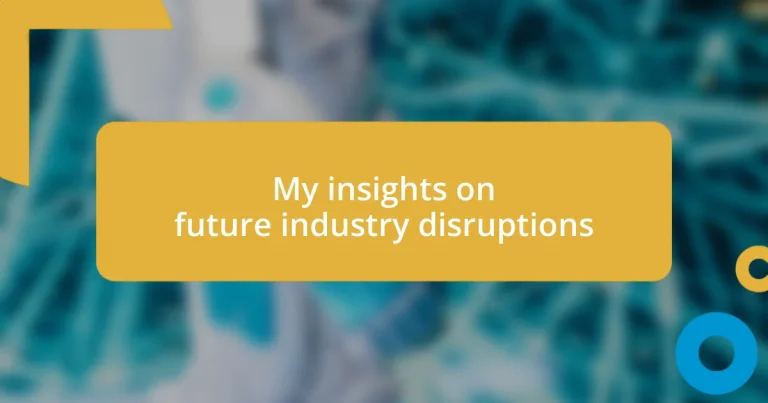Key takeaways:
- Adaptability and a customer-centric approach are crucial for businesses to thrive during industry disruptions.
- Emerging technologies such as AI, blockchain, and VR are reshaping sectors and enhancing operations and customer experiences.
- Fostering a culture of continuous learning and leveraging data analytics are essential strategies for anticipating and responding to changes effectively.
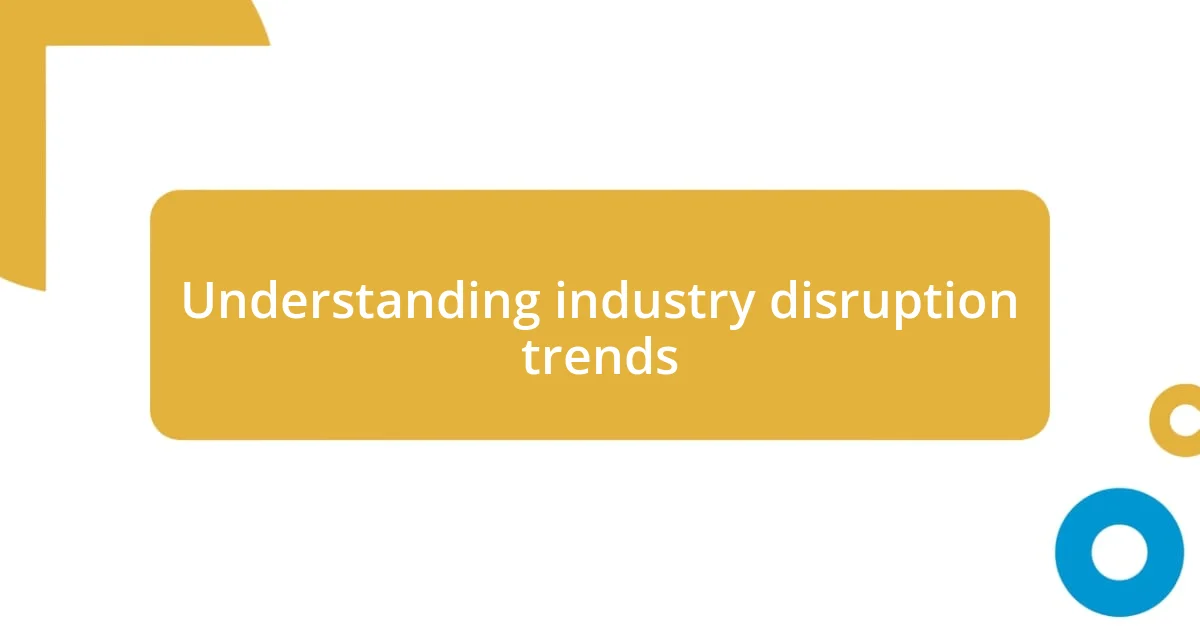
Understanding industry disruption trends
Understanding industry disruption trends requires a keen awareness of both emerging technologies and shifting consumer behaviors. I recall a time when I was deeply engrossed in analyzing how subscription models turned the traditional retail landscape upside down. Have you ever wondered how something as simple as delivering a box of curated products each month could fundamentally challenge long-established businesses?
It’s fascinating to see how technological advancements serve as both a catalyst and a barrier to disruptions. I remember attending a tech conference where an expert highlighted how artificial intelligence is reshaping services like customer support. Listening to them explain how AI chatbots not only enhance efficiency but also change customer expectations made me realize that disruptions often travel hand in hand with evolving consumer demands.
Moreover, the accelerated pace of change today makes it imperative to stay ahead of the curve. Reflecting on my firsthand experiences, I’ve noticed that companies unwilling to adapt historically find themselves left behind. It’s sobering to think: are we truly prepared for the next big wave of disruption, or are we merely reacting to changes happening around us?
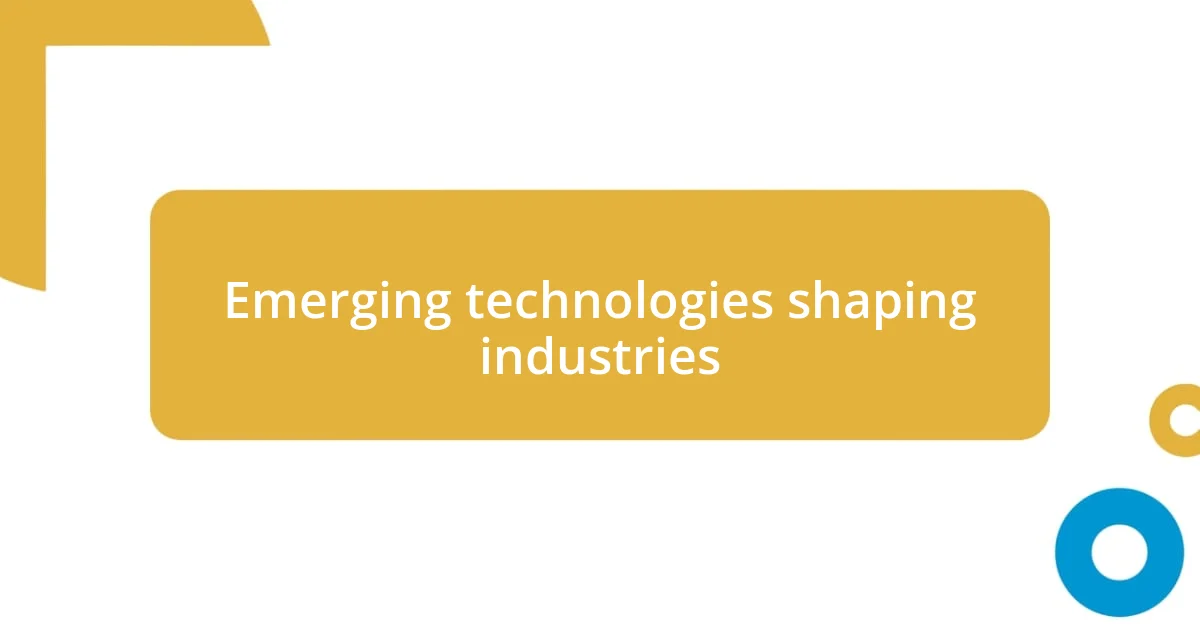
Emerging technologies shaping industries
Emerging technologies are reshaping industries in ways I find both exciting and challenging. For instance, when I first encountered blockchain technology, I was captivated by its potential to revolutionize supply chains. I remember discussing with a friend how it could bring transparency and traceability, not just in finance but throughout various sectors. Have you ever thought about how the very approach to trust in business could be overhauled with this innovative tech?
As the Internet of Things (IoT) continues to grow, I often reflect on my time experimenting with smart home devices. It’s remarkable how interconnected devices can optimize energy use and enhance security, especially for those of us who value both convenience and safety. This interconnectivity offers businesses unique insights into consumer behavior, enabling them to tailor products and services like never before.
Another aspect I can’t ignore is the rapid advancement of augmented reality (AR) and virtual reality (VR). I vividly recall trying on virtual clothes through an AR app and thinking about how transformative this technology is for retail. By allowing customers to visualize products in their environment before purchasing, these tools are not just enhancing user experience; they’re altering the fundamentals of shopping itself. How do you envision the retail landscape evolving with such immersive technologies at our fingertips?
| Technology | Industry Impact |
|---|---|
| Blockchain | Increases transparency and trust in transactions |
| Internet of Things (IoT) | Optimizes operations and enhances customer insights |
| Augmented Reality (AR) | Transforms retail experiences and consumer engagement |
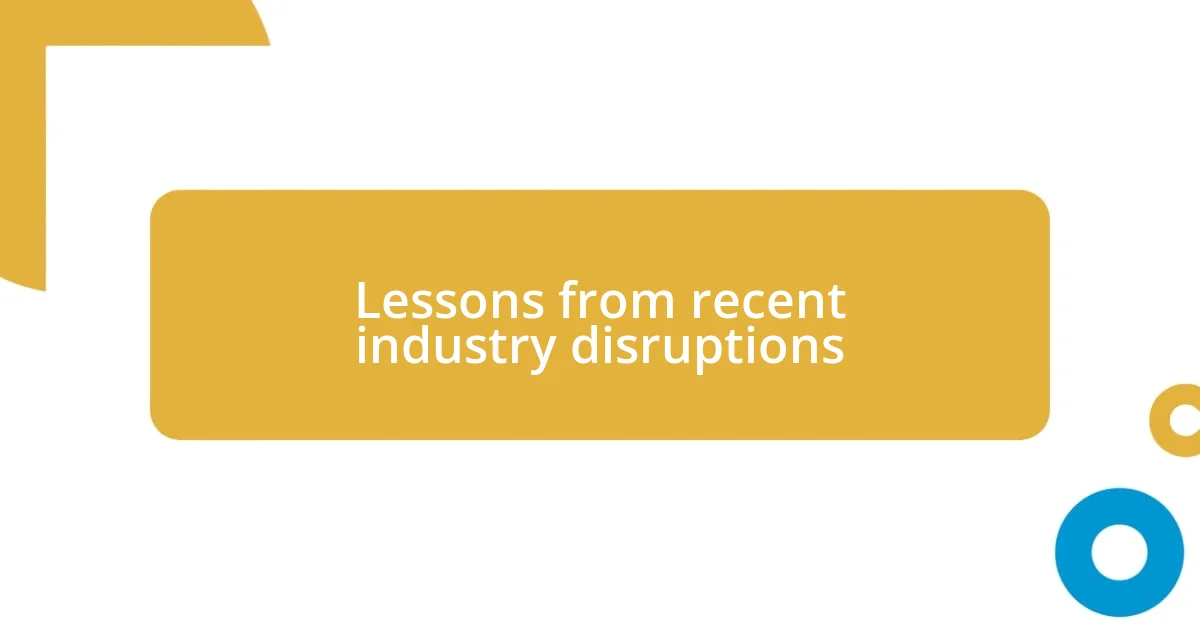
Lessons from recent industry disruptions
Thinking about recent industry disruptions, I can’t help but reflect on the lessons we’ve collectively learned. It strikes me how those companies that embraced flexibility and innovation managed to not just survive but thrive. It reminds me of a friend’s small business that pivoted to e-commerce during a challenging period. They started with a simple online platform, and within months, their sales exploded as they reached customers beyond their local market. That adaptability was key.
Here are some critical lessons from industry disruptions:
- Adaptability is essential: Businesses must be willing to pivot quickly as circumstances change.
- Customer-centric approach: Understanding and anticipating consumer needs can set a company apart.
- Embrace technology: Implementing new tools can enhance efficiency and improve customer engagement.
- Agility in decision-making: Streamlined processes enable companies to respond to market shifts immediately.
The rapid changes in industries have once again emphasized the importance of resilience. I can recall a time when traditional media outlets struggled to keep up with digital platforms. Those that clung to outdated models floundered, while others reinvented themselves, exploring avenues like podcasts and streaming. This transformation not only kept them afloat but also rejuvenated their brand identity. It’s a powerful reminder that disruptions can spawn opportunities if we’re willing to embrace change with open arms.
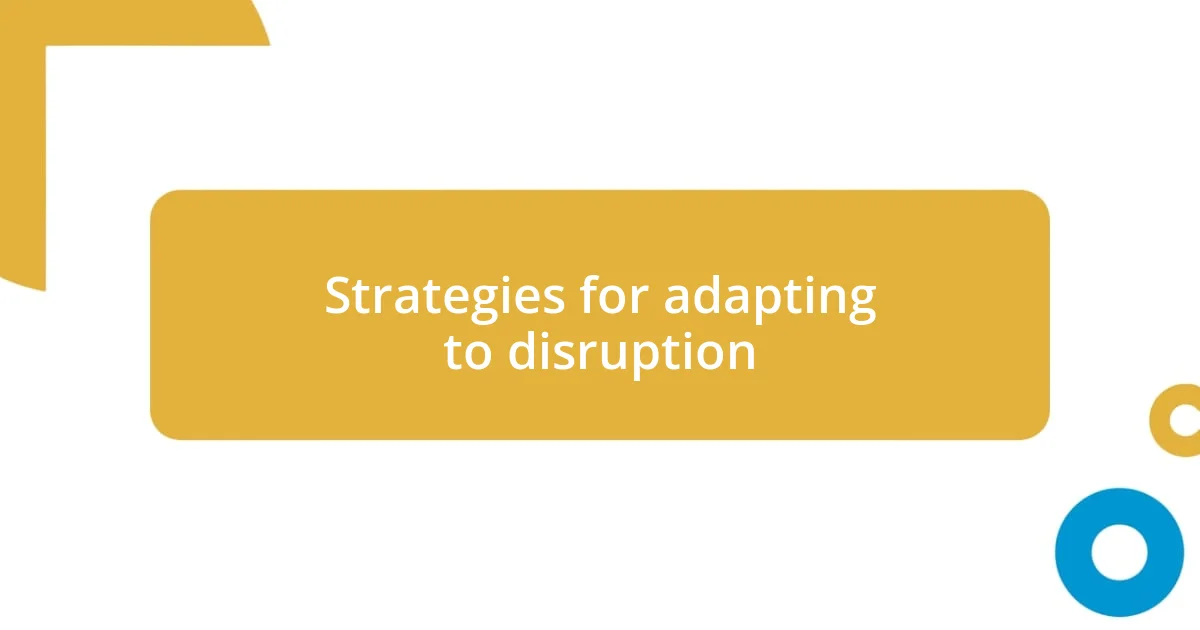
Strategies for adapting to disruption
One of the most effective strategies I’ve found for adapting to disruption is fostering a culture of continuous learning. I remember when my team embraced a mindset of “learn and iterate.” Every setback was seen as an opportunity for growth. Have you experienced a moment when a team’s ability to learn quickly turned a potential crisis into a breakthrough? I know that this practice not only builds resilience but also equips individuals with the skills to navigate shifting landscapes.
Another approach is to actively seek collaboration across industries. There was a time when I attended a conference where professionals from diverse sectors shared their experiences facing disruptions. I was struck by how insights from one industry could spark innovation in another. Engaging with others who think differently can open new avenues for creativity. Have you considered how cross-industry partnerships could enhance your own strategies?
Lastly, leveraging data analytics is crucial for anticipating changes and responding proactively. When I started incorporating data into decision-making processes, it was like turning on a light in a dark room. Suddenly, I could see patterns and trends that I had previously overlooked. This clarity allows organizations to make informed adjustments in real-time. How comfortable are you with using data to guide your strategic choices? In my experience, using data wisely can be a game-changer in navigating disruptions effectively.
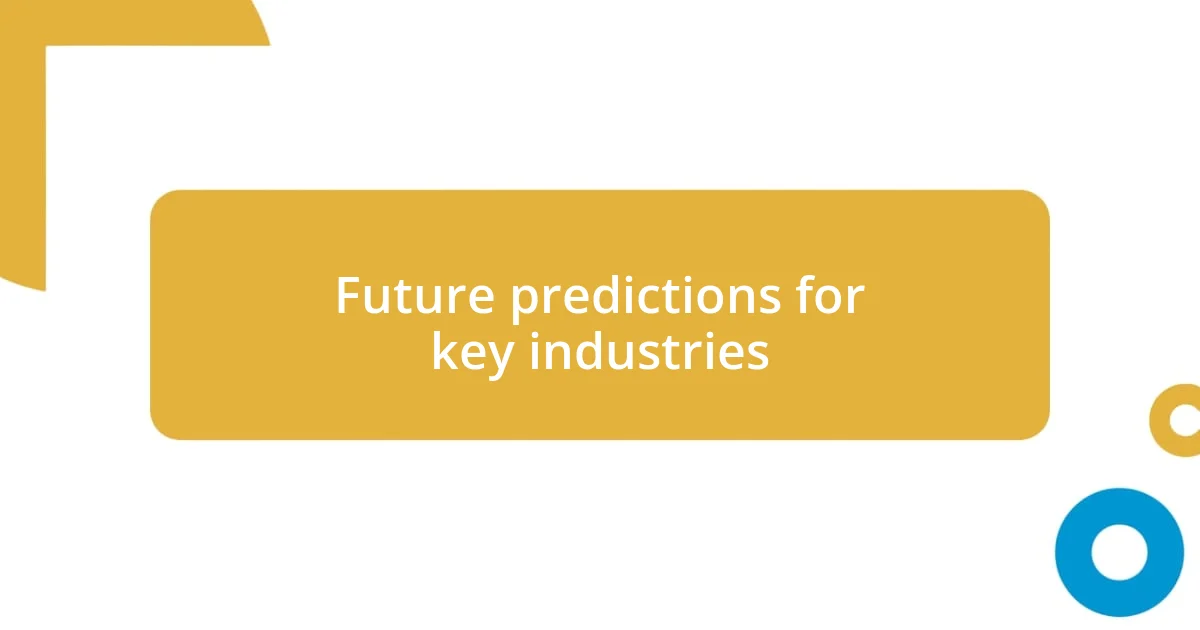
Future predictions for key industries
I believe the healthcare industry is on the cusp of significant transformation, particularly through telemedicine and AI advancements. I recall when my grandmother had to wait weeks for a specialist appointment; today, she can consult a doctor from the comfort of her home. As we move forward, I see telehealth becoming not just a convenience but a necessity, redefining how patients access care and ensuring that even the most remote areas have healthcare access. Isn’t it inspiring to think that technology could bridge such a gap?
The retail sector is also poised for drastic changes, largely driven by the integration of AI and virtual reality (VR). I remember my first experience using VR during a shopping event; it felt like stepping into a whole new world. In the near future, I predict that customers will shop through immersive environments, trying on clothes or testing products in a digital space before making a purchase. It raises the question: how can brands leverage this technology to not only enhance sales but also create unforgettable customer experiences?
Lastly, the shift towards sustainable practices is not just a trend; it’s becoming a fundamental expectation across industries, especially in food production. I was once part of a project that focused on farm-to-table dining, and seeing that direct connection between consumers and growers was eye-opening. Moving forward, I believe businesses that prioritize eco-friendly practices will not only attract conscientious consumers but also drive industry standards. How are you planning to incorporate sustainability into your own business model? I’d love to hear your thoughts on this vital shift!
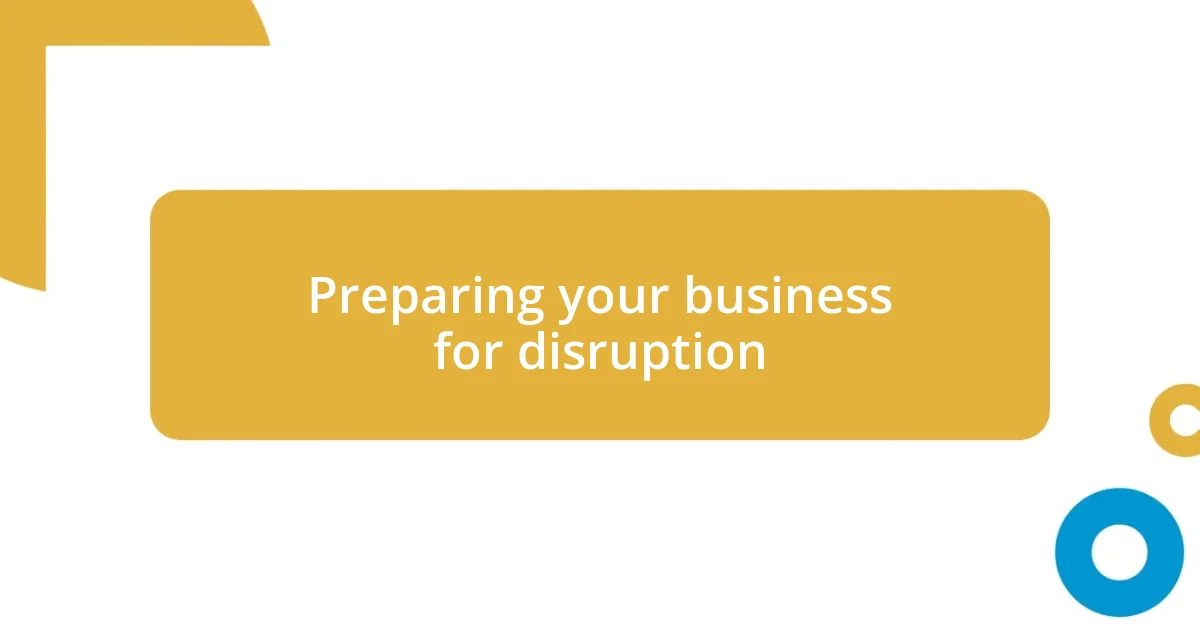
Preparing your business for disruption
Embracing change is vital in preparing your business for disruptions. I recall a time when my company faced an unexpected market shift that left us scrambling. We quickly formed a task force dedicated to identifying emerging trends and responding accordingly. It taught me that being proactive, rather than reactive, is a game changer. Have you ever experienced the urgency of needing to pivot on a dime? I’ve found that flexibility is not just advantageous; it’s essential.
Investing in technology and innovation is another cornerstone of preparation. In my previous role, we adopted new tools to streamline our processes and improve customer engagement. The initial investment seemed daunting, but the long-term benefits were astounding. Now, imagine your business not just surviving but thriving through disruption because you embraced technology early on. How tech-savvy is your company, and are you ready to face the future?
Finally, fostering strong relationships with your stakeholders is crucial. I remember a challenging period when open communication with clients and suppliers helped us navigate uncertainties together. This sense of community fostered loyalty and trust, which ultimately allowed us to weather the storm. Are you nurturing those relationships today? In my experience, building connections can make all the difference when disruption strikes.












